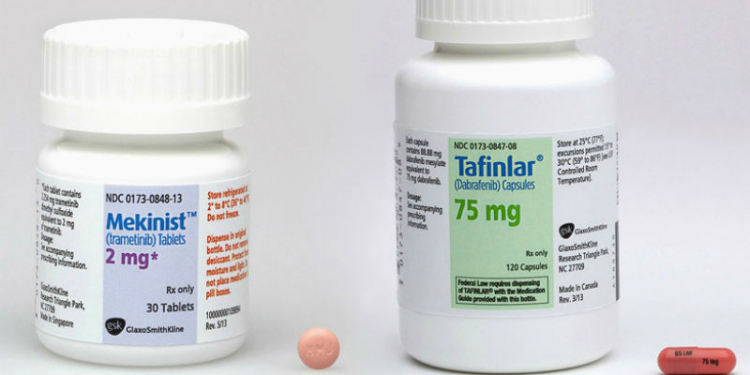The FINANCIAL — Novartis on September 11 announced results from a Phase III study of 870 patients with stage III BRAF V600E/K mutation-positive melanoma after complete surgical resection treated with the combination of Tafinlar (dabrafenib) + Mekinist (trametinib).
Findings from the COMBI-AD study, which met its primary endpoint, found a statistically significant 53% reduction in the risk of death or recurrence in patients treated with the BRAF and MEK inhibitor combination therapy versus placebo (HR [hazard ratio]: 0.47 [95% CI (confidence interval): 0.39-0.58]; median not reached vs. 16.6 months, respectively; p<0.001), with no new safety signals reported. Results of the study will be presented during the Presidential Symposium today at the European Society for Medical Oncology Congress (ESMO) in Madrid (Abstract #LBA6), and were simultaneously published in the New England Journal of Medicine, according to Novartis.
“The efficacy and tolerability of Tafinlar in combination with Mekinist seen in this study represent an important step forward in the treatment of stage III BRAF V600E/K mutation-positive melanoma,” said lead investigator Axel Hauschild, MD, PhD, Professor of Dermatology, University Hospital Schleswig-Holstein, in Kiel, Germany. “These unprecedented results confirm a targeted therapy combination has the potential to transform the standard of care in the melanoma adjuvant setting.”
“While surgery is a curative option for most patients with localized melanoma, there is a need for improved standard of care therapies for patients – especially for stage III disease, which carries a higher risk of relapse and death following resection,” said Vas Narasimhan, Global Head Drug Development and Chief Medical Officer, Novartis. “The COMBI-AD data results address a significant unmet need in patients with stage III melanoma. We look forward to discussing the results with regulatory authorities worldwide.”
The COMBI-AD study evaluated Tafinlar + Mekinist among patients with stage III, BRAF V600E/K-mutant melanoma without prior anticancer therapy, randomized within 12 weeks of complete surgical resection. Patients received the Tafinlar (150 mg BID) and Mekinist (2 mg QD) combination (n = 438) or matching placebos (n = 432)[1]. After a median follow-up of 2.8 years, the primary endpoint was met in that combination therapy significantly reduced the risk of disease recurrence or death by 53% vs. placebo (HR: 0.47 [95% CI: 0.39-0.58]; median not reached vs. 16.6 months, respectively; p<0.001). The relapse-free survival benefit among the combination arm was observed across all patient subgroups, including stage III A, B and C. The estimated one-year, two-year, and three-year RFS were consistently higher than placebo (one year: 88% vs. 56%; two year: 67% vs. 44%; three year: 58% vs. 39%). The combination treatment group also saw an improvement in a key secondary endpoint of OS (HR: 0.57 [95% CI: 0.42-0.79] p=0.0006, which did not cross the predefined interim analysis boundary of p=0.000019 to claim statistical significance). Other secondary endpoints where the combination demonstrated a clinically meaningful benefit include DMFS (HR: 0.51 [95% CI: 0.40-0.65]), and FFR (HR: 0.47 [95% CI: 0.39-0.57]).
Adverse events (AEs) were consistent with other Tafinlar + Mekinist studies, and no new safety signals were reported. Of patients treated with the combination, 97% experienced an AE; 41% had grade 3/4 AEs and 26% had AEs leading to treatment discontinuation (vs. 88%, 14% and 3%, respectively, with placebo).
In a separate study, Novartis presented Phase II results from BRF113928, showing efficacy for patients with BRAF V600E-mutant metastatic non-small cell lung cancer (NSCLC) without prior systemic therapy for metastatic disease when treated with the combination of Tafinlar + Mekinist (Abstract #LBA51) [3]. Among the 36 treatment-naïve patients receiving 150 mg of Tafinlar twice daily and 2 mg of Mekinist once daily, the overall response rate (ORR) was 64% (95% CI: 46%-79%). After a median follow-up of 15.9 months, median duration of response (DoR) was 10.4 months (95% CI: 8.3-17.9 months), and median progression-free survival (PFS) was 10.9 months (95% CI: 7.0-16.6 months). Median OS was 24.6 months (95% CI: 12.3 months-not estimable), two-year OS rate was 51% (95% CI: 33-67%). These study results were simultaneously published in The Lancet Oncology.
Findings from the study demonstrated clinically meaningful antitumor activity in patients who had not received prior systemic therapy and in patients who had received at least one platinum-based chemotherapy for their metastatic NSCLC, supporting recent approvals by the European Commission (EC) and US Food and Drug Administration (FDA).
The most common AEs (incidence >20%) were pyrexia, fatigue, nausea, vomiting, diarrhea, dry skin, decreased appetite, edema, rash, chills, hemorrhage, cough and dyspnea.
Additional poster and oral presentations related to the investigational use of Tafinlar and Mekinist in melanoma were also presented at the meeting, including:
Phase II Study of Neoadjuvant Dabrafenib + Trametinib (D+T) for Resectable Stage IIIB/C BRAF V600-Mutant Melanoma [Abstract #1220PD]
Five-year Efficacy and Safety Update From METRIC: Trametinib vs. Chemotherapy in Patients with BRAF V600E/K-Mutant Advanced or Metastatic Melanoma [Abstract #1226PD]
A Phase III Randomized, Double-Blind, Placebo-Controlled Study Comparing the Combination of PDR001 + Dabrafenib + Trametinib vs. Placebo + Dabrafenib + Trametinib in Treatment-Naïve Patients with Unresectable or Metastatic BRAF V600-Mutant Melanoma (COMBI-i) [Abstract #1259TiP]
KEYNOTE-022 Update: Phase I Study of First-Line Pembrolizumab (pembro) Plus Dabrafenib (D) and Trametinib (T) for BRAF-Mutant Advanced Melanoma [Abstract # 1216O]
A Phase II, Randomized, Open Label Study of Neoadjuvant Pembrolizumab with/without Dabrafenib and Trametinib (D+T) in BRAF V600-Mutant Resectable Stage IIIB/C/D Melanoma (NeoTrio Trial) [Abstract #1256TiP]
Dabrafenib and Trametinib Combination in Real Life Patients Including Brain Metastases: French Experience within MelBase [Abstract #1255P]































Discussion about this post